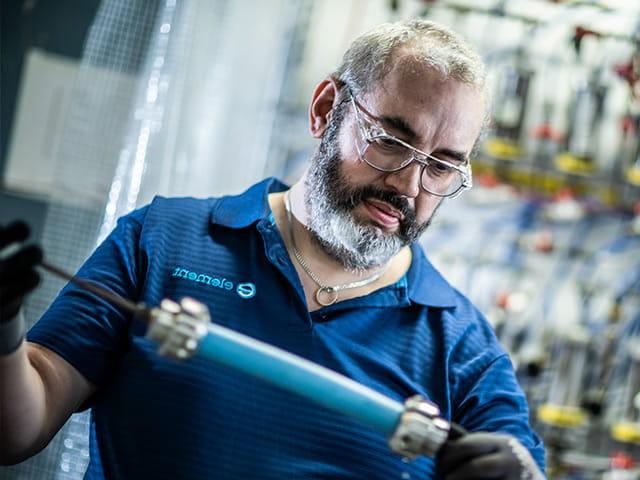Discover Element’s Leading Hydrostatic Pressure Test Service
Element provides an extensive capacity for determining the long-term hydrostatic strength of plastic pipes, offering a comprehensive suite of services from initial testing to regression analysis. Our focus is on delivering reliable and reproducible test data for the classification of Minimum Required Strength (MRS) to ISO 9080 and Hydrostatic Design Basis (HDB) services to ASTM D2837 and ASTM D2992.
As part of Element's global Plastic Pipes & Fittings Testing program, our hydrostatic pressure testing services cater to resin manufacturers, pipe extruders, certification bodies, and utility companies worldwide. We understand the critical need for independent and accurate test data for product classification and lifetime evaluation in the industrial sector.
Testing to ISO 9080 (MRS) and ASTM D2837 (HDB) involves a comprehensive evaluation process. It includes hydrostatic pressure testing to generate test data, followed by regression analysis to determine long-term hydrostatic strength. The final step involves the classification of Hydrostatic Design Basis (HDB) or Minimum Required Strength (MRS).
Advanced Hydrostatic Pressure Testing Service
ISO 9080 (MRS) Testing
Process: Rigorous hydrostatic pressure testing and regression analysis for precise classification of plastic pipes to ISO 9080 standards.
A complete evaluation includes hydrostatic pressure testing for generation of test data followed by regression analysis for determination of the long term hydrostatic strength, and finally classification of HDB (Hydrostatic Design Basis) or MRS (Minimum Required Strength).
- MRS classification to ISO 9080 is based on the long-term hydrostatic strength at 20°C and 50 years.
- HDB classification to ASTM D2837 / PPI TR-3 is based on the long-term hydrostatic strength at 73°F (23°C) and 100,000 hours.
ASTM D2837 / PPI TR-3 (HDB) Testing
Objective: Classify based on Hydrostatic Design Basis (HDB) using long-term hydrostatic strength at 73°F (23°C) and 100,000 hours.
Process: Hydrostatic pressure testing and regression analysis for compliance with ASTM D2837 and PPI TR-3 standards.
Standard Test Conditions
Temperature Variation: Tests conducted at 20°C, 60°C, 80°C for cold water/gas, and 20°C, 70°C, 95°C, 110°C for hot water. Fahrenheit temperatures used for ASTM standards. Material Diversity: Expertise in testing PE, PP, PB, PEX, PE-RT, PVC, PSu, and PA for a comprehensive evaluation.
High-Precision Measurement
Methodology: Robot cell for high-precision measurements, identifying minimum wall thickness. Automation: Automated measuring with computed radiography ensures thorough coverage, streamlining repetitive tasks with precision.
Diverse Material Evaluation: Comprehensive Hydrostatic Pressure Testing
We perform thorough hydrostatic pressure testing across a diverse range of polymer materials, ensuring a comprehensive evaluation of plastic pipes. Our expertise encompasses the testing of various materials, including but not limited to:
- PE (Polyethylene): Known for its versatility and durability, PE is widely used in plastic pipes for its excellent chemical resistance and flexibility.
- PP (Polypropylene): Recognized for its high thermal resistance and stiffness, PP is a popular choice in applications where these properties are crucial.
- PB (Polybutene): Offering a balance of flexibility and strength, PB is utilized in plastic pipes for its resistance to impact and aging.
- PEX (Cross-linked Polyethylene): Known for its exceptional temperature and chemical resistance, PEX is widely used in plumbing and heating systems. PE-RT (Polyethylene of Raised Temperature Resistance): Specially designed for elevated temperature applications, PE-RT ensures reliable performance under demanding conditions.
- PVC (Polyvinyl Chloride): PVC is valued for its chemical resistance, durability, and affordability, making it a common choice for various piping applications.
- PSu (Polysulfone): With high-temperature resistance and excellent mechanical properties, PSu is suitable for demanding industrial applications.
- PA (Polyamide): Known for its strength and impact resistance, PA is used in plastic pipes where durability and toughness are critical.
Plastic Pipes Testing Services
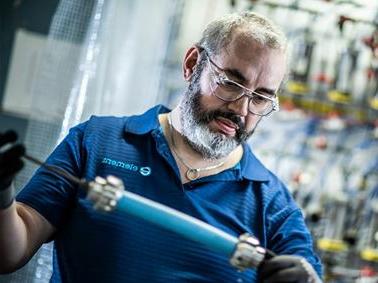
Hydrostatic Pressure Testing
Determination of long-term hydrostatic strength for plastic pipes to ISO 9080 (MRS) and ASTM D2837 (HDB).
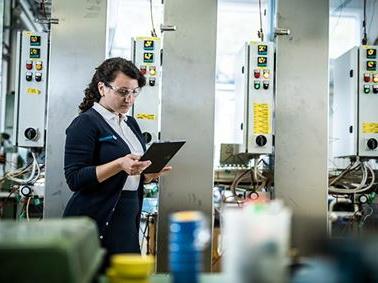
Chlorine Resistance Testing
Evaluation of oxidative resistance to chlorinated water for PE, PEX, PE-RT, and PP materials to ASTM F2023, ASTM F2263, and ASTM F3497-21.
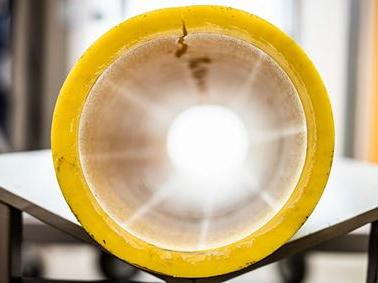
Rapid Crack Propagation, S4 Test
Determination of resistance to rapid crack propagation to ISO 13477 for PE pressure pipes at below zero temperature.
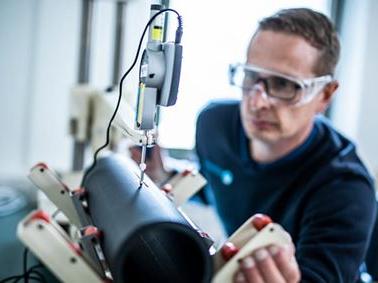
Slow Crack Growth Test to ISO 13479
Determination of slow crack growth to ISO 13479 on pre-notched PE and PEX pipes

High Flow Circulation Loop Testing
Experimental simulation of pipe life expectancy is affected by bend radius, types of fittings and pipe insulation using flowing water.
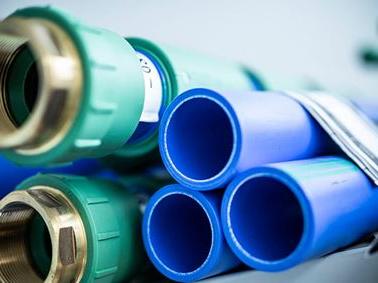
Plastic Pipes & Fittings Testing
Our plastic pipe testing program offers test data for product classification and lifetime evaluation to resin manufacturers, pipe extruders and certification bodies worldwide.
